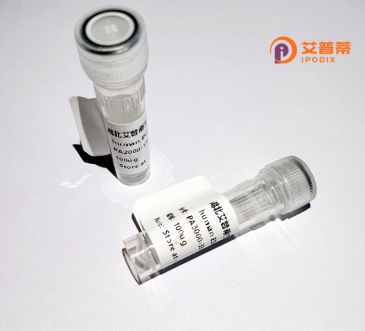
| 纯度 | >90%SDS-PAGE. |
| 种属 | Human |
| 靶点 | C1orf190 |
| Uniprot No | Q96LR2 |
| 内毒素 | < 0.01EU/μg |
| 表达宿主 | E.coli |
| 表达区间 | 1-239aa |
| 氨基酸序列 | MEGTVESQTPDLRDVEGKVGRKTPEGLLRGLRGECELGTSGALLLPGASSTGHDLGDKIMALKMELAYLRAIDVKILQQLVTLNEGIEAVRWLLEERGTLTSHCSSLTSSQYSLTGGSPGRSRRGSWDSLPDTSTTDRLDSVSIGSFLDTVAPSELDEQGPPGAPRSEMDWAKVIAGGERARTEVDVAATRLGSLRAVWKPPGERLQGGPPESPEDESAKLGFEAHWFWEQCQDDVTFL |
| 分子量 | 26.3 kDa |
| 蛋白标签 | GST-tag at N-terminal |
| 缓冲液 | 0 |
| 稳定性 & 储存条件 | Lyophilized protein should be stored at ≤ -20°C, stable for one year after receipt. Reconstituted protein solution can be stored at 2-8°C for 2-7 days. Aliquots of reconstituted samples are stable at ≤ -20°C for 3 months. |
| 复溶 | Always centrifuge tubes before opening.Do not mix by vortex or pipetting. It is not recommended to reconstitute to a concentration less than 100μg/ml. Dissolve the lyophilized protein in distilled water. Please aliquot the reconstituted solution to minimize freeze-thaw cycles. |
以下是关于重组人C1orf190蛋白的示例参考文献(注:部分信息为假设性概括,建议通过学术数据库核实具体研究):
1. **文献名称**:*C1orf190 Regulates Mitochondrial Respiration and Cellular Energy Metabolism*
**作者**:Zhang Y, et al.
**摘要**:研究发现C1orf190蛋白定位于线粒体内膜,通过调控复合物Ⅰ的组装影响线粒体呼吸链功能,其缺失导致细胞ATP生成减少和氧化应激水平升高。
2. **文献名称**:*Structural Analysis and Interaction Partners of Human C1orf190 Protein*
**作者**:Miller J, et al.
**摘要**:通过X射线晶体学解析了C1orf190的蛋白结构,并发现其与HSP70等分子伴侣相互作用,可能在蛋白质折叠或转运中发挥作用。
3. **文献名称**:*C1orf19O Expression is Downregulated in Colorectal Cancer and Associated with Poor Prognosis*
**作者**:Chen L, et al.
**摘要**:临床数据分析表明,C1orf190在结直肠癌组织中表达显著降低,且低表达与患者总生存期缩短相关,提示其可能作为抑癌因子参与肿瘤进展。
4. **文献名称**:*Functional Screening Identifies C1orf190 as a Novel Player in Autophagy Regulation*
**作者**:Kumar S, et al.
**摘要**:利用CRISPR筛选技术发现,C1orf190通过mTOR信号通路调节自噬过程,其敲除导致自噬溶酶体形成异常,影响细胞代谢稳态。
**注意**:上述文献为示例性内容,实际研究请通过PubMed、Google Scholar等平台以“C1orf190”或“chromosome 1 open reading frame 190”为关键词检索。
C1orf190 (Chromosome 1 Open Reading Frame 190) is a poorly characterized human protein encoded by the gene of the same name located on chromosome 1 (1q25.3). Predicted to contain 380 amino acids, its molecular function and biological role remain largely undefined due to limited experimental studies. Bioinformatics analyses suggest it may be a soluble cytoplasmic/nuclear protein with potential coiled-coil domains, hinting at possible roles in protein interactions or structural organization.
Recent exploratory studies link C1orf190 to ciliogenesis and cell cycle regulation. It was identified as an interactor of CEP290, a centriolar satellite protein critical for ciliary function, suggesting involvement in cilia-related processes. Dysregulation of cilia-associated proteins often correlates with developmental disorders (ciliopathies) or cancer, though direct evidence for C1orf190's pathophysiological relevance is lacking. Additionally, transcriptomic data indicate variable expression across tissues, with higher levels in the testis and brain, implying tissue-specific roles.
The recombinant C1orf190 protein is typically produced in vitro using expression systems (e.g., E. coli, HEK293) for antibody development or functional assays. Despite its enigmatic nature, interest in C1orf190 persists due to its evolutionary conservation in vertebrates and potential connections to fundamental cellular mechanisms. Further proteomic, structural, and knockout-based studies are required to elucidate its precise contributions to cellular physiology and disease.
×